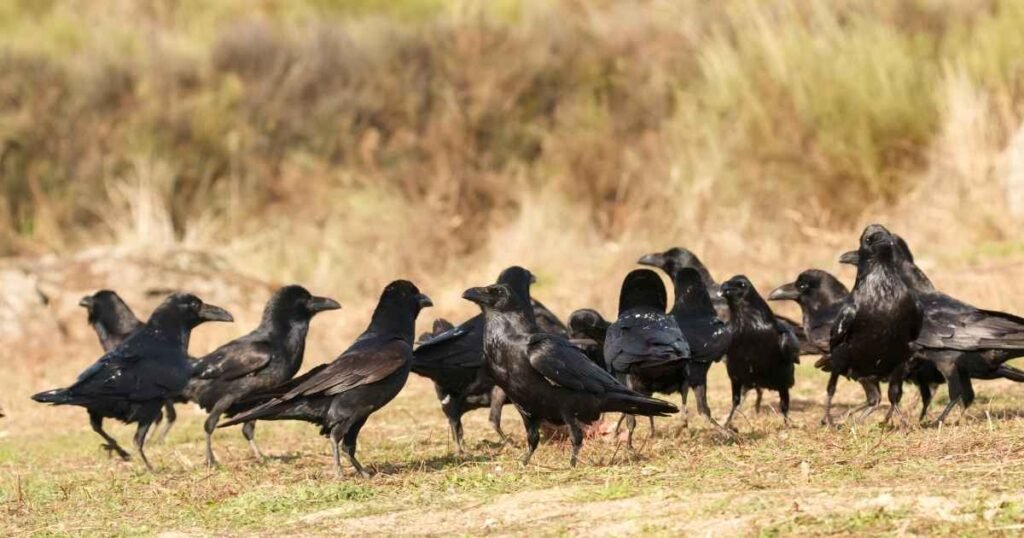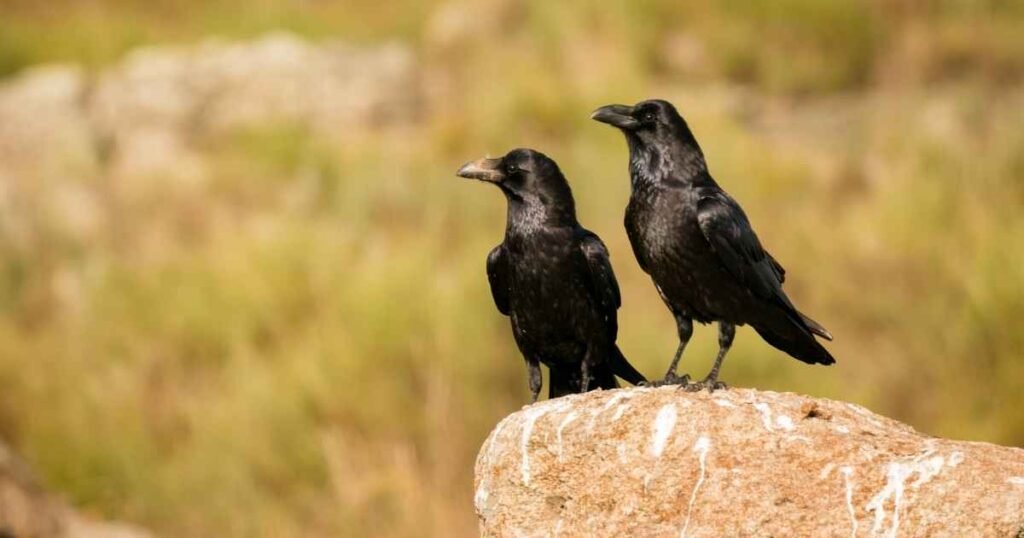Introduction to What Do Crows Like to Eat
The Diverse Diet of Crows
What do crows like to eat? Crows are highly versatile eaters with an omnivorous diet that allows them to adapt to various environments. When exploring what do crows like to eat, it’s clear that their preferences span a wide range of food sources. They enjoy seeds, fruits, and grains, making them frequent visitors to agricultural fields. Also, crows quest small creatures similar as insects, frogs, and indeed mice when the occasion arises. They are also opportunistic feeders, scavenging on carrion and leftover human food when available. This adaptability in diet is one of the reasons crows thrive in both urban and rural settings worldwide.
Why Understanding Their Diet Matters
Understanding what do crows like to eat is crucial for several reasons. First, it helps in maintaining healthy ecosystems since crows play a significant role as scavengers, cleaning up animal carcasses and organic waste. Second, for bird enthusiasts and researchers, knowing their dietary preferences aids in effective observation and study of their behaviors. Additionally, urban dwellers and gardeners may benefit from understanding what do crows like to eat to better manage interactions with these birds. Proper knowledge ensures coexistence and can even help in creating environments that support their natural feeding patterns without causing human-bird conflicts.
Must Read: Uploadarticle.com movies: Deliver Unforgettable Film Magic
Surprising Foods Crows Love
Junk Food Enthusiasts
Believe it or not, crows have a knack for finding and enjoying junk food. Potato chips, French fries, and even cookies have been spotted in their beaks. While this may be more common in urban settings, it showcases how crows are excellent at utilizing modern food sources. Junk food may not be ideal for their health, but it can be a quick source of energy.
Fascinated with Shiny Objects
Although shiny objects like coins and small trinkets aren’t technically food, there’s a theory that crows might mistake them for potential nourishment. It’s also possible that these objects’ sparkle just intrigues them. Either way, this unique behavior further emphasizes just how curious and exploratory these birds are.
Carrion Delicacies
Crows are natural scavengers and have no problem consuming carrion, i.e., the flesh of dead animals. This aspect of their diet is particularly important in their ecosystems, as it helps to clean up waste and recycle nutrients.
Grub and Worms
If you dig up your garden and come across a crow watching you, it’s probably waiting to snatch up any worms or grubs you uncover. These insects are not only rich in protein but also plentiful in the environments where crows are often found.
Natural Foods That Crows Enjoy
Fruits, Nuts, and Grains as Staples
When considering what do crows like to eat, fruits, nuts, and grains stand out as essential components of their diet. These natural foods provide the nutrients and energy crows need to thrive in various environments. Below are some common choices:
- Fruits: Apples, berries, cherries, and grapes are among the fruits crows frequently enjoy. These sweet and juicy options answer the question of what do crows like to eat when foraging in orchards or gardens.
- Nuts: Walnuts, almonds, and pecans are largely favored by crows. These nutrient-dense snacks serve as a perfect energy source, further illuminating what do crows like to eat.
- Grains: Corn, oats, wheat, and barley represent staple grains in a crow’s diet. Whether found in fields or leftover human food, these grains consistently answer the popular query of what do crows like to eat.
Understanding the role of these staples sheds light on the diverse eating habits of crows while fostering a greater appreciation for how they adapt to their surroundings.
Small Animals and Live Prey
Another aspect of “what do crows like to eat” encompasses small animals and live prey. These intelligent birds often seek out insects, worms, and even small mammals as part of their adaptable diet. Through hunting or scavenging, they obtain essential proteins that support their survival and reproduction. Crows also feed on amphibians or bird eggs, showcasing their opportunistic and predatory instincts. By learning “what do crows like to eat” in terms of live prey, researchers and bird watchers gain insights into their natural hunting behavior and ecological impact. This varied diet reflects their resilience and ability to thrive in diverse environments.
Surprising Habits of What Do Crows Like to Eat

Junk Food and Urban Scavenging
Crows have adapted impressively to urban environments, and their diet often includes human junk food. Items like French fries, chips, and leftover pizza have become irresistible options for these intelligent birds. By scavenging streets, parks, and garbage bins, they demonstrate remarkable survival skills in bustling cities. Observing “what do crows like to eat” in urban settings reveals how they capitalize on easily accessible resources. Their ability to consume processed foods shows their adaptability but raises concerns about potential health effects. Researchers continue to study their urban diets to understand their impact on ecosystems and urban wildlife behavior.
The Role of Shiny Objects in Crow Behavior
- Shiny objects frequently allure crows, showcasing their natural curiosity and intelligence.
- Researchers suggest their attraction to reflective items may stem from a combination of playfulness and an instinct to investigate new objects.
- While shiny trinkets are not part of “what do crows like to eat,” crows have been observed collecting such items and even incorporating them into their nests.
- This geste demonstrates their capability to interact with their terrain in unique ways, further pressing their rigidity in colorful territories, including civic areas.
- Studying their interest in shiny objects helps scientists uncover clues about their cognitive abilities and social behaviors.
Seasonal Changes in What Do Crows Like to Eat
Winter Adaptations and Food Scarcity
During winter, food scarcity greatly influences what do crows like to eat. With fewer insects and fruits available, crows adapt by scavenging for scraps, relying heavily on human-provided food sources such as garbage or bird feeders. Their resourcefulness becomes evident as they break into tough seeds or forage for small mammals where possible. Additionally, their diet may include carrion, offering essential nutrients during frigid months. This adaptability allows crows to survive harsh conditions, showcasing their resilience. By understanding what do crows like to eat in winter, we gain insights into how they thrive under limited resources.
Autumn and the Obsession with Nuts
Autumn marks a season when what do crows like to eat prominently includes an abundance of nuts. During this time, crows are often seen obsessively gathering and storing acorns, walnuts, and other tree nuts. These nuts serve as critical energy sources, rich in fats and proteins, which help them prepare for the lean winter months ahead. Interestingly, crows demonstrate remarkable memory, often remembering where they’ve hidden their food caches for later consumption. This seasonal behavior underscores the intricate connection between what do crows like to eat and their survival strategies in changing environmental conditions.
Tips for Attracting Crows with Food
Foods That Encourage Crows to Visit
When considering what do crows like to eat, focus on foods that are rich in nutrients and easy to access. Shelled peanuts, unsalted and unflavored, are a favorite, as their protein and fat content provide valuable energy. Fruits like apples, grapes, and berries also attract crows due to their natural sugars. Additionally, small pieces of meat or cooked eggs can diversify their diet and draw them in. Spreading these foods in open, visible areas increases the chances of attracting a curious crow. Providing a steady supply of fresh water nearby can make your space even more inviting.
What Foods to Avoid Feeding Crows
While learning what do crows like to eat is important, it’s equally crucial to understand what to avoid. Processed foods, including bread or chips, lack sufficient nutrition and can even harm their health over time. Similarly, avoid salty snacks, as high sodium levels can be toxic to birds. Foods containing artificial sweeteners or spices are another no-go, as these substances are unnatural and potentially dangerous for crows. By avoiding these items, you help maintain their health and support their natural dietary needs, encouraging safe and sustainable birdwatching practices.
For more informative and interesting articles visit: royallmagazine.com
The Connection Between Crows’ Diet and Ecosystems
Their Role as Nature’s Clean-Up Crew
Crows play a pivotal role in maintaining balance within ecosystems by acting as nature’s clean-up crew. These highly intelligent birds consume carrion, decaying organic matter, and food scraps, reducing the spread of diseases and pests. By scavenging on what they find, crows prevent waste accumulation and contribute to a cleaner environment. Understanding “what do crows like to eat” helps highlight their dietary versatility, which allows them to adapt to diverse habitats and fulfill this essential ecological function. Their proactive scavenging fosters healthier ecosystems, benefiting both humans and wildlife.
How Their Eating Habits Benefit Biodiversity
The eating habits of crows significantly contribute to biodiversity by promoting natural balance. Their diet, which includes seeds, insects, and small animals, aids in pest control and seed dispersal for native plants. Knowing “what do crows like to eat” can emphasize their ecological importance, as their varied consumption supports habitats’ stability and sustainability. Furthermore, by preying on invasive species or weak organisms, crows help maintain stronger, more resilient populations within their ecosystems. Their role in these natural processes helps preserve the intricate web of life that defines a healthy, biodiverse environment.
Final Thoughts
Crows play an essential role in maintaining ecological balance and fostering biodiversity. Their diverse diet not only highlights their adaptability but also underscores their importance to native ecosystems. By understanding “what do crows like to eat,” we gain insights into their contributions to pest control, seed dispersal, and the stabilization of habitats. These intelligent birds support environmental health by preying on invasive species and ensuring stronger populations within various ecosystems. Protecting and appreciating crows is crucial for preserving the intricate and vital balance of our natural world.



